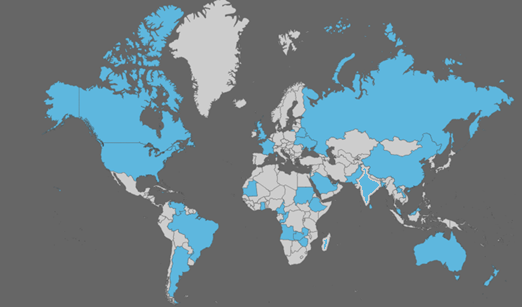China is hungry and looking outside its borders for ways to feed its 1.35 billion citizens.
In recent years Chinese companies and investors have become some of the largest players in the vertical supply chain for global agriculture. It's a Chinese investment trend that will only accelerate as the country's population increases.
According to the Heritage Foundation, Chinese investors have pumped $27.9 billion into the agricultural sectors of more than 30 nations.
But one aspect of this Chinese investment trend has stirred some concern. The Asian giant has bought vast tracts of farmland in nations across Asia and Africa.
According to a recent study, an amount of farmland equal to the size of France and Germany combined has transferred from local landowners, to foreign investors from the United States, to investors in China.
The tremendous size and scope of this Chinese investment trend soon will have massive implications for the global food supply and the price of commodities.
China's Agricultural Reach Spreads Across Six Continents
It's a trend that has the world on edge - even the media.
Last Tuesday, Quartz.com erroneously reported that Chinese investors had signed a deal to acquire rights to farm approximately 11,583 miles, or three million hectares, in Ukraine for 50 years. The deal between KSG Agro and China's Xinjiang Production and Construction Corps (XPCC) would have leased an area of farmland equal in size to the state of Massachusetts or the country of Belgium.
KSG Agro quickly denied the deal in a press statement on its website. Nevertheless, the incident has heated up the intense international debate over foreign investment in domestic farmland and raised even greater questions about China's ongoing surge of global agricultural investment.
Though this report turned out to be false, it turned the spotlight again on China's extensive farmland-buying activity around the world.
One big problem is that the Chinese investors have struggled with how to properly develop the land and collaborate with technology and science companies capable of maximizing production.
Still, buying up farmland is only one way the country has been trying to procure more food. China has invested in all segments of the global food supply chain, from water irrigation projects to large multinational businesses like Smithfield Foods Inc. to small biofuel projects in Ethiopia.
The map shows nations where the Chinese have invested in agriculture:

Source: The Heritage Foundation
The Implications of This Chinese Investment Trend
It may be true that this Chinese investment trend will spur innovation in the agricultural markets, but it has serious social drawbacks.
Critics argue that the purchase of farmland draws comparisons to colonialism. Similar actions have long been a source of anger toward multinational oil companies, which typically benefited consumers in the United States and other First World nations.
According to a study by the Proceedings of the National Academies of Sciences (PNAS), up to 1.75% of global agricultural land is now under the control of foreign investors rather than local landowners.
But these locations are not home to wealthy populations. Land grabbers from China to Wall Street have sought arable land in nations like the Congo, Sudan, Indonesia, Tanzania, Mozambique, and Ethiopia.
The people native to these lands will witness their potential food supply end up in the hands of foreign markets.
Nonprofits around the world have taken notice of the domestic impact of these purchases.
In 2012, Human Rights Watch accused the Ethiopian government of forcing the relocation of tens of thousands of its people so that its leaders could lease farmland to China and sheiks in the Middle East. The nonprofit's report said that "government failure to provide food assistance for relocated people has caused endemic hunger and cases of starvation."
Land grabbing has also accelerated in Latin America and even in Europe. Large European deals, involving thousands of hectares, have been reported in Romania, Hungary, Bulgaria, Germany, Italy, and Spain and have spurred demands for European Union legislation to ban the practice altogether.
Since the surge of commodity prices over the last decade, the Chinese investing trend of land grabbing has accelerated.
But as the population ticks toward 9 billion around the world, the threat of social unrest over higher food prices and the willingness to lease land to foreign companies could wreak havoc in nations all across the world.
Note: Much of the Chinese investments in agriculture are occurring in frontier markets - countries that have great economic promise but have only recently begun to deliver on that promise. Here's how to invest in frontier markets and tap the world's fastest growth...
Related Articles:
- Money Morning:
How to Invest in Agriculture After the Potash Price Crash - Money Morning:
G8 Plan to Invest in Africa Agriculture Smacks of Colonial Land Grab
About the Author
Garrett Baldwin is a globally recognized research economist, financial writer, consultant, and political risk analyst with decades of trading experience and degrees in economics, cybersecurity, and business from Johns Hopkins, Purdue, Indiana University, and Northwestern.



